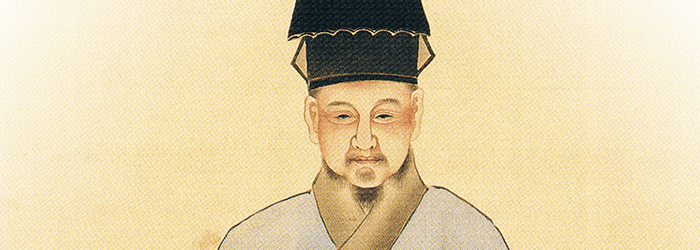Lu Yu and The Classic of Tea: Tea Writing Traditions

Image by 春木南溟 (図録「増山雪斎 -大名の美意識-」 2007 桑名市博物館) Public Domain
We love to sing the praises of traditional methods when it comes to tea growing, harvesting, and brewing, and we are fortunate to live in an age when sharing and accessing this information has never been easier. These days, it’s easy to forget how rare and precious tea knowledge was in China over a thousand years ago. Amazingly, much of the knowledge that has survived to this day is due to the dedication and passion of one man: Lu Yu, the tea scholar.
Lu Yu was a self-taught scholar and author of The Classic of Tea, the oldest surviving guide to tea from traditional China, published sometime in the late 8th century. Though the work itself is extremely interesting and valuable, the life of Lu Yu is, by all accounts, fascinating. Like a folk hero in an old story, he was found as an infant abandoned by a river and was brought to a monastery where he grew to adulthood. The stories say that the monastery tea garden is where Lu Yu was first introduced to tea, and that he would spend all his free time caring for the garden, studying the tea, and perfecting his brewing process. He eventually became so absorbed in his tea habit that he refused to drink any tea unless he brewed it himself.
His life took an exciting turn when he fled the monastery before taking his vows, and found himself writing plays for a traveling theatrical group. During his travels, Lu Yu continued to study and learn all he could about tea. He soon found a wealthy patron in Li Qiwu, a governor so impressed with Lu Yu’s knowledge that he offered Lu Yu access to his library and a formal tutor.
It was around this point in his life that he wrote The Classic of Tea.
Text by Lu Yu, via Wikimedia Commons. Public Domain
The Classic of Tea is a truly comprehensive guide to traditional Chinese tea in the 8th century. Lu Yu devotes ten chapters to the complete process of tea growing, harvesting, crafting, and brewing, paying special care to documenting the tools and techniques of the farmers and craftsman. There are painstaking descriptions of everything, down to the smallest tool and crafting detail.
The exhaustive handbook included notes on where the best tea is grown, the best ways to identify tea quality, and even an entire chapter devoted to documenting important tea references in literature and poetry. Lu Yu also included his own commentary on the practices of popular tea brewing. He deeply disapproved of popular methods of tea brewing that called for the additions of other flavorings, such as onion, ginger, orange peels, or flowers, calling it “not unlike the swill of drains and ditches”.
Lu Yu’s writing gives the impression of deep frustration that tea was not better understood in his time. With every single earnest (and very precise) description of tea production and brewing, Lu Yu's passion for tea is undeniable on every page.
All things on Earth are born with unique and mysterious wonders, and yet only a human can muster and perfect a life. No mere shelter, we live in intricately designed houses, dress in fabulous clothing, eat delicious food and drink exquisite alcohol. Such refinement, and yet most people do not know how to prepare and drink fine tea!
Unfortunately, translated copies of The Classic of Tea are currently out of print. You can find a copy at your local library, or you can read the translation quoted in this article online. We highly recommend giving it a read, not only because it’s an interesting glimpse into the distant past, but also as a way to appreciate the the tea traditions we have inherited. After all, there can be no traditions without someone to pass them on. And for that, we must thank Lu Yu.
Sources
"Lu Yu. The Classic of Tea, introduced and translated by Francis Ross Carpenter, pp. 12-16, pp. 51-52.
Lu Yu. The Classic of Tea, translated by Wu De. Global Tea Hut. pp. 31-61. Sept. 2015
De, Wu. “Lu Yu: the Tea Sage.” Global Tea Hut. pp. 19-23. Sept. 2015.
Sign up for our newsletter to get blog updates in your inbox!




Comments on this post (0)